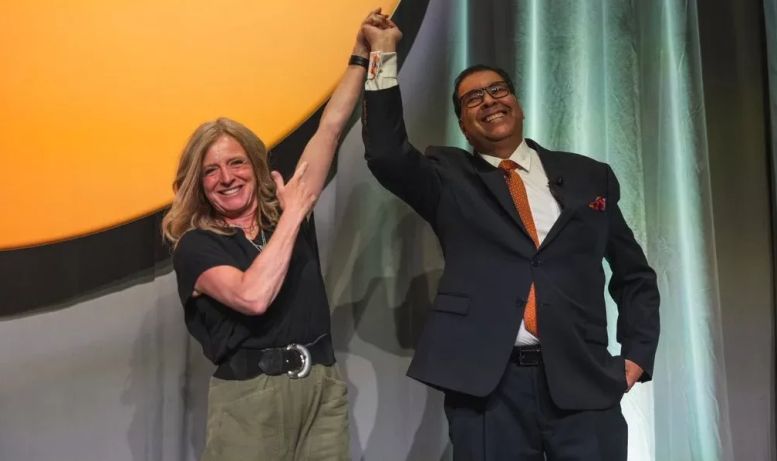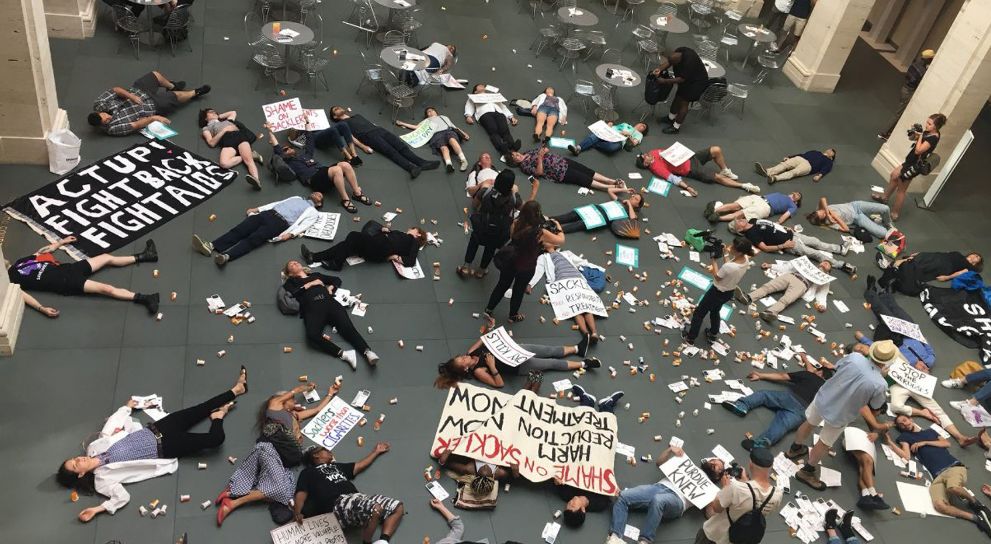One year ago, after the defeat of the NDP in the Alberta general election, Socialist Alternative warned about the Alberta NDP’s fatal strategy of trying to appeal to conservatives or “to be a party for all Albertans.” This strategy failed in the 2023 general election and Danielle Smith, despite her controversial policies, became the premier. Following the NDP’s election defeat there was “lingering frustration, even anger, that the NDP lost the 2023 election to someone as controversial and unpopular as Smith.”
A year later, the NDP held a leadership race with Naheed Nenshi handily winning the race, running on a campaign for the NDP to be a party for all Albertans, with the slogan Naheed Nenshi. For Alberta. For All of Us. The campaign focused as much on the need to defeat the UCP as it did on specific, progressive policies.
Win monumental
Nenshi’s win was monumental, reportedly winning by the largest number of votes for any provincial party leader in Canadian history. He won by 86 percent, a total of 62,746 votes out of the 72,930 members who voted. After Nenshi declared his candidacy, the NDP membership numbers soared. At the end of 2023, there were about 16,000 members and by the leadership vote, the numbers grew to over 85,000.
Naturally, parties strive to win elections. It appears that the frustration and anger over losing the election to the UCP drove members to find someone who was known and seen as electable and resulted in members voting en masse for Nenshi. At least for now, the NDP is seen as Nenshi’s party. There were debates and issues raised among candidates, but reports were that the race itself was fairly amicable. Nenshi built on his popularity as mayor of Calgary, with many considering him the best mayor Calgary has had. Nenshi was first elected in 2010 and became the first Muslim mayor of a major North American city. In 2024, he was awarded the World Mayor Prize.
Nenshi and Danielle Smith have known each other for years, both graduating in 1993 with bachelor degrees from the University of Calgary. Nenshi’s degree was in in commerce, Smith’s was in English. They both participated in the campus debate society, and both took a political science course taught by former premier Peter Lougheed. Smith became a media commentator and business lobbyist. Nenshi went to Harvard for a degree in public administration, worked for management consultant McKinsey & Company, described by some as the world’s most powerful consulting firm. He then taught non-profit management at Mount Royal College (now a university).
Nenshi outsider candidate
As mayor, Nenshi seemed to take pride in being non-partisan. He wore purple (combination of red and blue) as a symbol of this non-partisanship. However, when he ran as leader of the NDP, there were concerns about choosing a leader with no history in the party.
Bringing in an outsider candidate, particularly one who straddled the divide between left and right, is risky. COPE, Vancouver’s political party with a proud history of standing up for renters and the working class, learned that lesson years ago when they chose high-profile candidate, Larry Campbell, in 2002 as its mayoral candidate. Campbell was a former coroner who inspired the CBC television crime drama series, Da Vinci’s Inquest, and he was the inspiration for the lead character in the series. With Campbell as its mayoral candidate, COPE had its best showing ever: every COPE candidate who ran won their seat. However, two years later, Campbell and some COPE councillors left, splitting into a pro-developer centrist party, Vision Vancouver. The price COPE paid for bringing in someone from the outside who had a high profile but whose politics were not aligned, is that to this day COPE has not recovered its electoral power and still struggles for its voice and politics to be heard.
Similarly, in Britain, Tony Blair was seen as a fresh face and electable but ended up moving the Labour Party to the right — a party in favour of war and privatization. He oversaw neoliberal policies and was a strong supporter of the foreign policy of George W Bush, dragging the British army into the 2001 invasion of Afghanistan and the 2003 war on Iraq.
Anti-union concerns
Another concern raised is whether Nenshi is anti-union. This concern largely stemmed from a letter he wrote as Calgary mayor in 2019, urging the United Conservative Party government for help on a city plan to sell off public services to private operators. The letter asks the province to allow new owners of sold-off entities not to be bound by existing collective agreements. However, Nenshi said the letter is not what it appears to be, instead said it was “political manoeuvring to thwart local attempts to privatize Calgary golf courses, because he knew the request would be denied by the province on legal grounds.” He insisted that he strongly opposed this privatization and wanted backing from the province. However, this rings hollow to some. Gil McGowan, President of the Alberta Federation of Labour, a contender in the leadership race (but who later withdrew) said, “This raises red flags about Naheed’s judgment. At worst, it suggests that when push comes to shove, he can’t be counted on to take the side of workers. . .That’s a pretty serious concern to be raised about someone who is running to lead what is, or at least was, the workers’ party.”
Nenshi is adamant that he firmly supports unions.
Pressure to take the middle ground
These concerns are not only legitimate, but important when there is pressure for parties to straddle the middle ground and not take firm positions.
The BC NDP has prioritized resource extraction, which do not provide a lot of long-term jobs, over the health of the planet and good secure jobs. The BC NDP gave the go-ahead to the hugely controversial Site C Dam once it was elected and has actively supported the climate change disaster of the LNG pipeline in Wet’suwet’en territory. The BC NDP government has looked for some halfway position between the needs of the working class and the aims of big business. When the labour movement lobbied for 10 paid sick days during the COVID pandemic and business wanted no paid sick days, it split the difference, agreeing to 5 paid sick days. This was after Doug Ford in Ontario had agreed to provide 5 sick days. It has consistently refused to introduce strong rent control as tenants face evictions so landlords can jack up the rents.
Environment and resource extraction economy
The Alberta NDP’s previous leader Rachel Notley campaigned to end Alberta’s reliance on fossil fuels which had widespread public support. An opinion poll before the 2015 election found that 86% of Albertans thought the province’s economy was too dependent on oil and gas and 71% thought the oil and gas companies do not pay enough in royalties to the province. However, as we warned in office the NDP supported the fossil fuel industry. They continued the long Alberta government tradition of having a cozy relationship with oil interests. Steve Burgess, self-described as The Tyee’s spin doctor, notes that “The NDP’s usual themes of environmental responsibility do not go over well in a province where even the NHL team names involve extraction and combustion.” In a province which depends on oil and gas for much of its revenues, how will Nenshi deal with two competing aspects of his campaign: for a “more prosperous Alberta with a strong economy fueled by innovation and entrepreneurship” and “a greener and safer Alberta, proactively addressing climate change and mitigating the risk of fires and continuing drought?” Will he challenge the dominance of the oil industry?
After all the oil industry is not providing jobs, it is shedding jobs. Between 2014 and 2022 the oil industry cut nearly 50,000 jobs and the trend has continued since then.
When Progressive Conservative Peter Lougheed was Premier, he created the Heritage Trust Fund to protect Albertans from the ravages of the boom-and-bust oil economy. He believed in high taxes on the oil companies to provide a future for Albertans beyond dependence on oil and gas revenues. Alberta’s Heritage Trust Fund has been frittered away by subsequent conservative governments. In contrast, the Norway Trust Fund, modelled after Alberta’s — had over US$1.62 trillion in assets as of March 2024, making it the world’s largest single sovereign wealth fund.
Style versus substance
Another concern raised by some, perhaps those with differing political views, is that Nenshi’s style is more about form than substance, that he has a knack of saying the right things, but what does he stand for? The NDP grew and Nenshi won because of his appeal to those outside the traditional NDP fold, “galvanizing supporters on anti-UCP sentiment rather than policy proposals.” But University of Lethbridge professor, Trevor Harrison, said, “that strategy will eventually grow stale and actual meat is needed on policy bones to charm supporters outside the party’s loyal urban base.”
UCP reaction
So how has the UCP and Danielle Smith reacted to Nenshi’s landslide? Jason Nixon, one of the more reactionary members of the UCP caucus, compared Nenshi to Stalin. He attacked an NDP proposal for rent control in Alberta, in a province that saw the highest rent increases in the country (at 20%) over the past year. Nixon said, “It’d make Joseph Stalin blush, how much this NDP wants to go down the road of communism in our province.” He followed this with an attack on Nenshi, claiming he will turn the NDP into his own vanity political movement using his “purple revolution” brand.
Ties to federal NDP
Some NDP members raised concerns in the leadership campaign about the ties of the Alberta NDP to the federal party. This stems from the deep unpopularity in Alberta of the federal liberals and that the NDP is propping up the government. Trudeau is hated while Singh is seen as the tail of the Liberal dog. After many members expressed concern about the connection, Nenshi campaigned to bring this to a vote among members. The constitution of the NDP currently stipulates that if you become a member of the provincial party, you are automatically a member of the federal party. “There’s no point in dilly-dallying about it,” Nenshi said. “I promise that I will put in a transparent process for the members to make the decision once and for all.” Singh and Nenshi met recently to discuss this.
Looking ahead
Nenshi pledges he will now embark on a tour of Alberta, visiting disaffected rural areas, to try and build support for the NDP. This will be a challenge as the bastion of support for the NDP is the urban centres of Calgary and Edmonton. Rural Alberta is UCP territory. But if the NDP is to become a party for “All of Us,” as Nenshi pledged, this will be necessary. What remains to be seen is whether he will seek to broaden his support by watering down the program and policies, or if he will be bold and deliver the policies needed for workers across Alberta, both urban and rural.
Political parties are about more than winning. They are about making policies. Conservative parties in government blatantly rule in favour of the rich and big business. The NDP with Nenshi as leader might win the next election, given Danielle Smith’s many blunders and unpopular policies. However, unless Nenshi’s NDP makes real changes, the rich will get richer, fires and drought will worsen due to climate change and when this oil boom busts, Alberta will be back in crisis.
What is needed more than ever is a strong campaigning socialist party. Its many policies to provide a good future for all in Alberta would include challenging the dominance of the oil industry, taxing oil revenues and using the funds for good public services. At the same it would reverse Smith’s crazy attacks on renewable energy and instead invest in it and energy efficiency, both of which would provide good long-term jobs.




